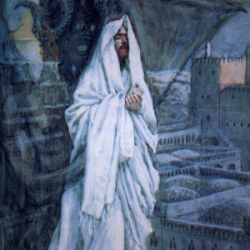 A Twitter skeptic and a Twitter user (the former of whom we'll call "Skeptic," the latter a "Tweep") sit drinking delicious, locally-brewed adult beverages. The Skeptic comments to the Tweep, "I think Twitter is a bunch of hooey. You're on Twitter all the time. Explain to me why I shouldn't write it off as completely tangential to the Church."
A Twitter skeptic and a Twitter user (the former of whom we'll call "Skeptic," the latter a "Tweep") sit drinking delicious, locally-brewed adult beverages. The Skeptic comments to the Tweep, "I think Twitter is a bunch of hooey. You're on Twitter all the time. Explain to me why I shouldn't write it off as completely tangential to the Church."
The Tweep responds, "No problem. In fact, I'll take you one step further and explain how Twitter helps me understand the Church and live more faithfully, but first, you have to help me out. Can you explain to me what you understand ‘the Church' to be in the first place?"
Skeptic: No problem.The Church, as you surely know is the "body of Christ" as we find described often in the New Testament. Some form of this phrase is in Romans, 1 Corinthians, Ephesians, and Hebrews. By using the "body of Christ" phrase, I don't think Paul means the Church is Christ's body in a literal sense. Rather, he was using the metaphor of a body to explain the connections in the Church. Of course, that's not all, scripture also refers to the Church as the people of God, as the new creation, and lots of other images, actually.
Tweep: Okay, sounds good so far. But, what does that mean? Or to put it another way: how do you tend to think about the Church? I mean, do you think "body" when you think "Church" or what?
Skeptic [taking a sip of bubbly beverage]: Hmmm, let's see. First, I guess, using the Church as the body of Christ image, I think of people (like you and me) as the body, and Christ as the head of the body. Part of that has to do with connection between people, I suppose. Of course, it's not just you and me who are connected, but all believers. Connection in the Church is pretty awesome, actually, understanding that the grace in Christ makes us one with another, even and especially those with whom we disagree. Of course, we don't make the connections real, God does it, but through the power of the Spirit we can get a glimpse at how we are connected in Christ.
But other than people, (or more specifically than people) when I think of the Church, I also think of people's God-given gifts. Through the Spirit, people are bound together and gifted with different abilities and ways to serve God (I'm thinking of 1 Corinthians 12, I suppose).
Tweep: Let me stop you there for a second. Nice, yeah. You're getting at how the body of Christ, the Church, is not in one physical location. In fact, one of the main points in this type of theology is that the Church is not stuck in one place or associated with one building, but is where the people are. Jesus said, "Wherever two or three are gathered in my name, I am there with them." But then there's this timeless sense as well, right? I mean, the Church isn't just what exists in 2010, right?
Skeptic: Totally, good point. Martin Luther talked about the Church militant and the Church triumphant to distinguish between saints presently alive serving God on earth and those who have died. But believers both alive and dead are part of the Church. It gets into that timeless nature of belief, that we are connected, by faith, to believers in every time and place. And, more recent theologians have even emphasized the fact that the Spirit can and does move outside the Church as well.
But enough about the Church, what does this all have to do with Twitter?
Tweep: Right, okay, good point. Here it goes: thinking of the Twitter community really helps me visualize thinking about the Church. First, there are these weird connections all over the place through the power of this crazy-ether-cyberspace-thing that I don't understand but trust to work (most of the time, at least). For instance, on Twitter I follow people I've never met and probably never will meet. I don't know what they look like beyond their little profile picture. I don't know their story, but I know something of them because of Twitter. And that something, that connection, helps me appreciate them and causes me to consider life more fully.
Take @jameskimlcop. I follow James on Twitter. His info says he's a pastor in Washington State, but I've never met the guy. But I have prayed for him. I've rejoiced with him and mourned with him, reflected with him and been enriched by his contributions through his tweets. Is he the pastor to whom I'd go if I had a life crisis? No, but I do put out prayer requests on Twitter and feel supported by that community.
And, not unlike Paul who speaks of the many gifts of the Spirit, Twitter helps me to hear and appreciate and consider the multitude of God-given gifts (a much wider range than I'd know of or enjoy without Twitter).




